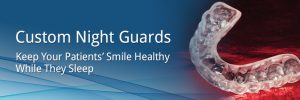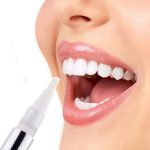
You’ve recently invested in $10,000 worth of dental implants and crowns, and now all of a sudden you notice that you’re grinding your teeth at night. You know this might be the case becasue every time you go to the Dentist’s for hygiene appointments, your Dentist notices ‘wear and tear’ — often a sign of bruxism (teeth grinding). What now? How do you protect your dental implants from damage? How do you avoid spending more money to fix restored teeth? Your answer is… an occlusal guard otherwise known as a “night guard.”
Not just any mouthguard will do… a mouthguard that is lab created to solve your bruxism issue and help protect your dental implants.
A “crown”, protects and restores a tooth that has been damaged by injury, age or decay. While a crown is a strong and durable dental restoration, they are not completely immune to damage themselves. If a crown becomes damaged, it may blemish the aesthetics of the tooth and possibly leave your natural tooth vulnerable to infection and decay. While a crown can be replaced (if needed), it is always recommended to take care of the crown to extend its lifespan.
Causes of Cracked or Damaged Crowns
Under ideal circumstances, a dental crown can last for many years. However, just like a natural tooth, there are factors that put undo wear and pressure on a crown, possibly resulting in a crack or damage to the point that replacement is required. Below are some common causes of cracked and damaged crowns, and how to avoid…
- Injury: An injury to the mouth or face, particularly one involving a traumatic blow or fall, may cause a dental crown to crack or become damaged. It is nearly impossible to prevent this type of injury from happening, however, precautions can be taken to ensure that the teeth and any dental crowns are protected. Whenever you are involved in sports or other physical activities that carry a threat for injury, patients should wear a custom athletic mouth guard, protecting your teeth and jaw in the case of unexpected trauma.
- Teeth grinding or clenching: Teeth grinding and clenching are two habits that put an excess amount of pressure on the teeth. With the teeth constantly pressing or grinding against each other, damage is a likely outcome. A dental crown is not meant to withstand these habits and can easily become damaged. In most cases, grinding and clenching occur at night, so if Patients are unable to control these habits through relaxation methods, a mouth guard should be worn at night to protect the teeth from these damaging habits.
- Excessive wear and tear: There are other habits, aside from clenching and grinding, that put excessive pressure on the teeth. These include nail biting and habitual consumption of hard, sticky foods like whole nuts and hard candies. The best way to protect dental crowns from this damage, is to avoid these habits and limit the amount of foods that could put too much force on teeth and crowns.
- Poor oral health: Although a dental crown is meant to protect the natural tooth, plaque and tartar still collects around the surrounding gum line, and may work its way down to the tooth. If decay or gum disease develop, the dental crown itself may not show signs of damage, but it will need to be removed so that the teeth and gums can be treated.
By taking proper precautions, most Patients can avoid causing damage to their dental crowns. In the cases where a crack or damage does occur, Dr. Malcomson can provide adequate treatment to ensure that damage is repaired and the treated tooth remains protected. We will be more than happy to provide you with a Treatment Plan detailing cost and benefits associated with the right mouthguard.
The Right Treatment at The Right Time!
Andrea Phipps, Practice Manager




